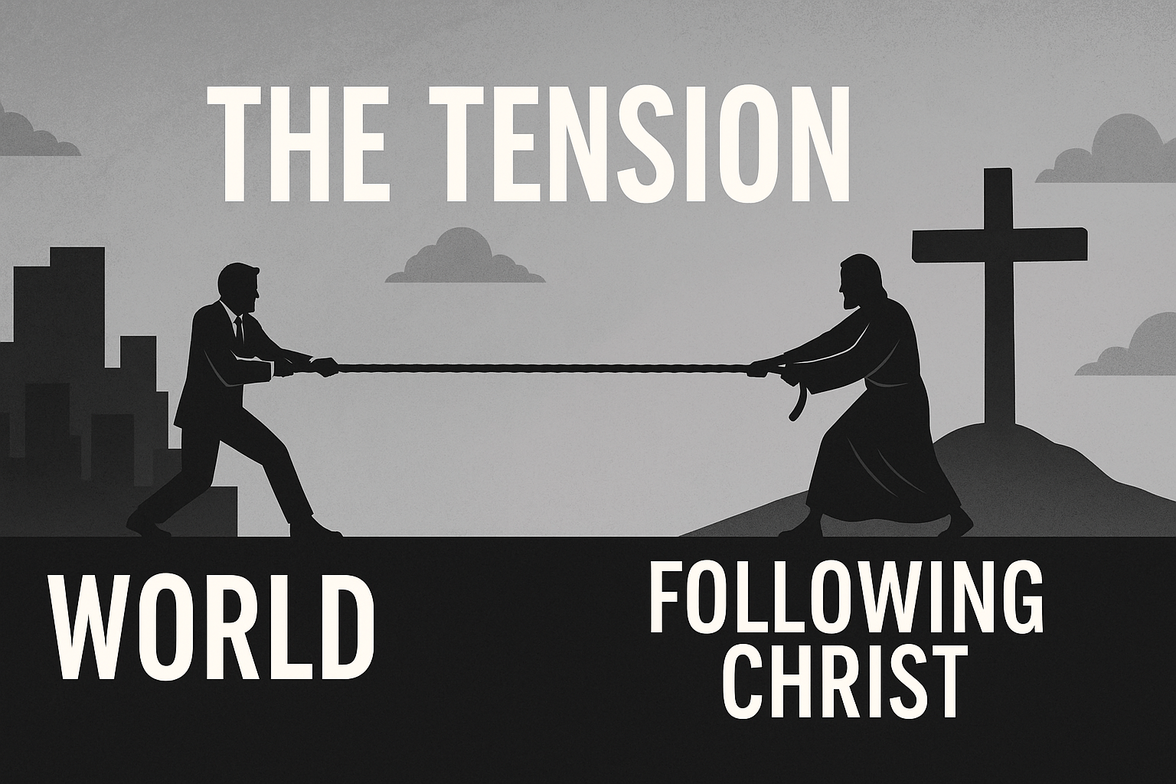
Many of us truly desire to please God. We long to live faithfully in His kingdom, yet we
often stumble. As the Apostle Paul confessed: “For I do not do the good I want, but the evil I do
not want is what I keep on doing” (Romans 7:19). This leaves us asking, “What is wrong with
me?” The answer is not that something is broken beyond repair in us, but that this very tension is
the reality of living in the world but not of the world (John 17:14–16). It is the pull of the
kingdom of God clashing with the fallen order of man.
Scripture itself describes this dual reality. On the one hand, we are warned: “Do not love
the world or anything in the world. If anyone loves the world, love for the Father is not in them”
(1 John 2:15). Yet on the other hand, we read the beloved words: “For God so loved the world
that He gave His one and only Son” (John 3:16). At first, this seems contradictory—are we to
hate the world or love it? The resolution is found in understanding what “world” means in each
context. In John 3:16, world refers to God’s creation—the people, the earth, the system He
designed in Genesis. In passages like 1 John 2:15, world refers to the fallen system of rebellion
that humanity set up against God.
Because the world in rebellion is corrupt, anything it produces—its systems, values, and
temptations—will also be corrupt (Genesis 3). Yet in Christ, we are given the Spirit, who both
convicts and comforts us. He dwells within us, and His presence is magnified when we gather
with God’s people.
In our day-to-day lives, we constantly feel this tension—pulled between our fallen nature
and our desire to serve God. In that struggle, we often stumble. As Scripture reminds us, “all
have sinned and fall short of the glory of God”(Romans 3:23). In those moments, our response
must be to turn back to Him—repenting, seeking His mercy, and striving to live faithfully within
that tension.
Jesus Christ Himself is our intercessor —He walked this tension first and perfectly,
bridging the gap between the brokenness of the world and the holiness of the Father (1 Timothy
2:5). He calls us to follow Him, and as Dietrich Bonhoeffer once said, “When Christ calls a man,
he bids him come and die.” This is the heart of our daily tension—learning to die to self and live
as Christ.
And yet, here is the beauty: Christ has not left us without relief. He gave us His body—
the Church. In the gathering of His people, the tension is released. When we come together, we
have a foretaste of heaven on earth, a sacred reprieve where the struggle gives way in worship,
and the kingdom of God becomes more tangible among us.
Many of us struggle to put into words the difference between God living in us through
His Spirit and God being with us in a unique way when we gather with His people. Yet,
whenever we try to walk apart from the fellowship of believers, we often feel just as isolated as
the rest of the world.That is because something powerful happens when we come together. In the gathering,
the tension is relieved. We are reminded that though we live in the world, we are not of it (John
17:14–16). In those moments of worship, we step into a space set apart—a place dedicated to the
kingdom of God on earth. We call these spaces sanctuaries for a reason: they are sacred, holy,
and meant to reflect God’s presence. When we enter together into these sacred spaces, the pull of
worldly distractions and temptations fades. The tension between the fallen world and God’s
kingdom is lifted, and for a time we rest fully in His presence.
This is why the church community matters so deeply. Though the Spirit lives in each
believer, something unique happens when we come together in worship. As Hebrews 10:24–25
reminds us, we are not to neglect meeting together, because in the gathering the tension is
relieved. In these moments, we step into a space dedicated to God’s kingdom, a sanctuary set
apart. Here, the distractions of the world fade, repentance paves the way to joy, and we taste—
however briefly—the reality of heaven on earth.
So, the tension is evidence that we are living the Christian life honestly. We repent
because sin is real, but we rejoice because Christ is greater. And when we gather, we practice
what will one day be perfected: a life where the tension is finally gone, and joy fully remains.